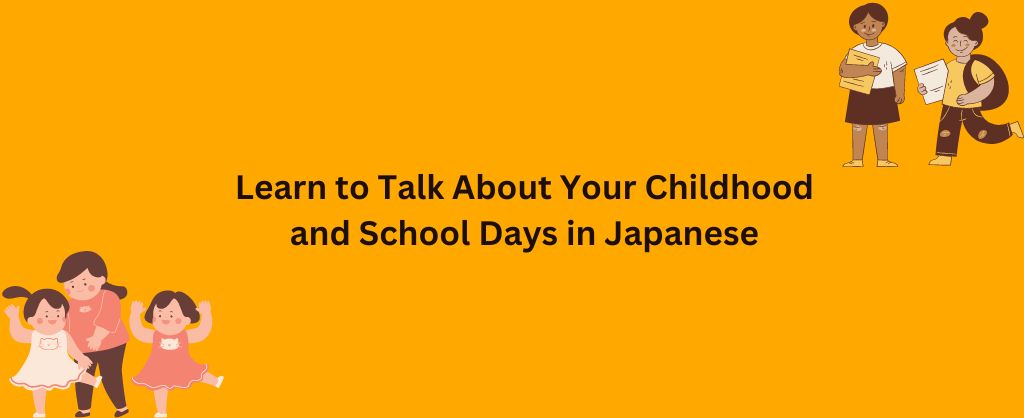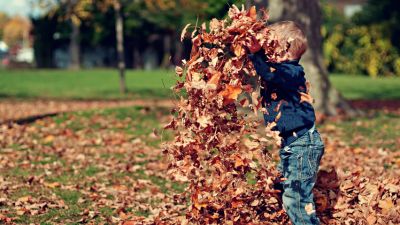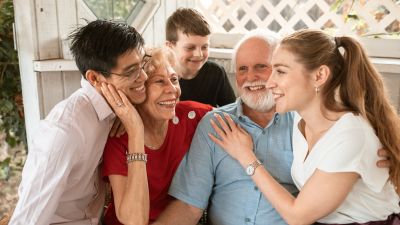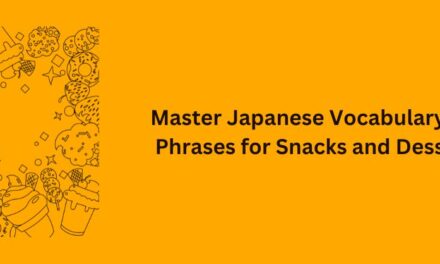Learn to Talk About Your Childhood and School Days in Japanese

Register For the Online Japanese Event
For many of us, childhood is a time of carefree play and exploration. We spend hours running through fields, climbing trees, and building forts.
We make friends easily, share our toys freely, and see the world as a place of endless adventure. Our imaginations run wild, and we believe that anything is possible.
Content
- Key Vocabulary and Phrases Related to Childhood
- Talking About Your Childhood Memories
- Important Milestones
- Talking About Your Family
- Adolescence and School Life
- Useful Phrases for the Conversation
Key Vocabulary and Phrases Related to Childhood
Childhood is a time of learning and growth. We learn to read, write, and count. We discover new interests and hobbies. We learn to navigate the complex social world around us, and we develop the skills we need to succeed in life.
Our childhood experiences lay the foundation for our future, shaping our beliefs, values, and aspirations.
Learning to speak about childhood and adolescent experiences is an important part of developing your Japanese language skills.
Here are some common Japanese words related to childhood:
- 子供 (こども – kodomo) – child
- 赤ちゃん (あかちゃん – akachan) – baby
- 幼稚園 (ようちえん – yōchien) – kindergarten
- 小学校 (しょうがっこう – shōgakkō) – elementary school
- 遊ぶ (あそぶ – asobu) – to play
- おもちゃ (omocha) – toy
- 友達 (ともだち – tomodachi) – friend
Some useful phrases:
- 小さい時 – when I was little (chiisai toki)
- 幼稚園に通っていた – I went to kindergarten (youchien ni kayotteita)
- 小学校で – at elementary school (shougakko de)
Essential Vocabulary for Sports and Exercise in Japanese
Talking About Your Childhood Memories
To talk about your childhood memories in Japanese, you can use phrases like:
- 小さい時、友達と公園で遊んでいました。- When I was little, I used to play in the park with my friends. (Chiisai toki, tomodachi to kouen de asondebimashita.)
- 幼稚園の時、塗り絵が大好きでした。- When I was in kindergarten, I loved coloring pictures. (Youchien no toki, nurie ga daisuki deshita.)
- 小学校で一番楽しかったのは休み時間でした。- The most fun thing about elementary school was recess. (Shougakko de ichiban tanoshikatta no wa kyuujikan deshita.)
Important Milestones
Here are some important milestones related to growing up:
- 生まれる (うまれる – umareru) – to be born
- 歩く (あるく – aruku) – to walk
- 話す (はなす – hanasu) – to speak
- 誕生日 (たんじょうび – tanjōbi) – birthday
- 入学 (にゅうがく – nyūgaku) – entrance ceremony
- 卒業 (そつぎょう – sotsugyō) – graduation
You can talk about these milestones using phrases like:
- 3歳の時、初めて一人で歩きました。- When I was 3 years old, I walked by myself for the first time. (San-sai no toki, hajimete hitori de arukimashita.)
- 5歳の誕生日に、初めて自転車に乗りました。- On my 5th birthday, I rode a bike for the first time. (Go-sai no tanjoubi ni, hajimete jitensha ni norimashita.)
- 小学校に入学する時、とてもワクワクしていました。- When I entered elementary school, I was very excited. (Shougakkou ni nyuugaku suru toki, totemo wakuwaku shiteimashita.)
Talking About Your Family in Japanese
Family is an integral part of most people’s lives and experiences. In Japanese, there are specific words used to refer to immediate and extended family members.
Knowing how to say words like “mother”, “father”, “brother”, “sister”, “grandparent”, and more in Japanese is essential.
Talking About Your Parents
When talking about your childhood, you’ll want to mention your parents and family. Here’s how to say “mother” and “father” in Japanese:
- 母 (はは – haha) – mother
- 父 (ちち – chichi) – father
You can use phrases like:
- 母はいつも私の面倒を良く見てくれました。 – My mother always took good care of me. (Haha wa itsumo watashi no mendou wo yoku mite kuremashita.)
- 父は仕事が忙しかったですが、遊びに連れて行ってくれることがありました。- My father was busy with work, but sometimes took me out to play. (Chichi wa shigoto ga isogashikatta desu ga, asobi ni tsurete itte kureru koto ga arimashita.)
Talking About Your Siblings
To mention your siblings, use words like:
- 兄 (あに – ani) – older brother
- 姉 (あね – ane) – older sister
- 弟 (おとうと – otōto) – younger brother
- 妹 (いもうと – imōto) – younger sister
Some examples:
- 兄と一緒に宿題をするのが楽しかったです。- I enjoyed doing homework with my older brother. (Ani to issho ni shukudai wo suru no ga tanoshikatta desu.)
- 妹は生まれた時、とても小さかったです。- When my younger sister was born, she was very tiny. (Imouto wa umareta toki, totemo chiisakatta desu.)
- 弟とゲームで競争するのが好きでした。- I liked competing with my younger brother in games. (Otouto to gemu de kyousou suru no ga suki deshita.)
Adolescence and School Life
Here are some useful terms related to adolescence and school life:
- 思春期 (ししゅんき – shishunki) – puberty, adolescence
- 中学校 (ちゅうがっこう – chūgakkō) – junior high school
- 高校 (こうこう – kōkō) – high school
- 部活 (ぶかつ – bukatsu) – club activities
- 受験 (じゅけん – juken) – entrance exams
- 成長 (せいちょう – seichō) – growth
- 青春 Seishun – Teenage/adolescent years
- 青春時代 – Seishun jidai – Teenage/adolescent period
- 教科 – Kyouka – School subject
Some examples Sentences:
- 思春期は友達関係が複雑でした。- Relationships with friends were complicated during puberty. (Shishunki wa tomodachi kankei ga fukuzatsu deshita.)
- 部活で一生懸命頑張りました。- I worked very hard in my school club activities. (Bukatsu de isshoukenmei ganbarimashita.)
- 高校受験でたくさん勉強しました。- I studied a lot for my high school entrance exams. (Koukou juken de takusan benkyou shimashita.)
- 10代は人格形成にとって大切な時期です。- Your teenage years are an important time for character development. (Juu-dai wa jinkaku keisei ni totte taisetsu na jiki desu.)
More Useful Phrases for the Conversation
子供の頃の夢は何でしたか?- Kodomo no koro no yume wa nandeshitaka? What was your dream when you were a child? (Like what you wanted to be when you grow up?)
子供の頃の写真をシェアしてください。- Kodomo no koro no shashin o shea shite kudasai! – Share a picture of when you were a child.
昔の自分にアドバイスができたら、どんなアドバイスをしますか?- Mukashi no jibun ni adobaisu ga dekitara, donna adobaisu o shimasuka? – If you could give your childhood self advice, what would you tell them?
子供の頃よく勉強をしましたか?- Kodomo no koro yoku benkyou o shimashitaka? – Did you study a lot as a kid?
子供の頃スポーツをしましたか?- Kodomo no koro supootsu o shimashitaka? – Did you do any sports when you were a kid?
子供の頃どんなものが好きでしたか?- Kodomo no koro donna mono ga suki deshitaka? – What kinds of things did you like as a kid?
子供の頃どんな人に憧れていましたか?- Kodomo no koro donna hito ni akogarete imashitaka? – Who did you admire when you were a kid?
子供の頃どの教科が一番好きでしたか?- Kodomo no koro dono kyouka ga ichiban suki deshitaka? – Which school subject did you like when you were a kid?
どんなおもちゃで一番遊びましたか?- Donna omocha de ichiban asobimashitaka? – What toys did you play with the most (as a kid)?
子供の頃日本に興味がありましたか?- Kodomo no koro nihon ni kyoumi ga arimashitaka? – Did you have any interest in Japan when you were a kid?
一番心に残る青春の思い出はなんですか?- Ichiban kokoro ni nokoru seishun no omoide wa nandesuka? – What was your most memorable experience as a teenager (adolescence)?
青春時代どんな音楽を聞きましたか?- Seishun jidai donna ongaku o kikimashitaka? – When you were a teenager, what kind of music did you listen to?
青春時代何にはまっていました?- Seishun jidai nani ni hamatte imashita? – When you were a teenager, what were you into? (hobbies, style, anything…)
子供・青春時代何が一番懐かしいですか?- Kodomo/ seishun jidai nani ga ichiban natsukashii desuka? – What do you most miss from your childhood, or teenage years?
どんな場所で育ちましたか?- Donna basho de sodachi mashitaka? – What kind of place did you grow up in? (big city, farm, country side, etc…)
青春時代に一番好きだった有名人は誰でしたか?- Seishun jidai de ichiban suki datta yuumeiijin wa dare deshitaka? – Who was your favorite celebrity when you were a teenager?
青春時代に一番好きな本は何でしたか?- Seishun jidai ni ichiban suki na hon wa nandeshitaka? – What was your favorite book when you were a teenager?
Conclusion
With this vocabulary and these phrases, you can now talk about important childhood memories, school life, family relationships, and coming-of-age experiences in Japanese.
Don’t be afraid to open up and share your personal stories. The more you practice talking about your background, the more your language skills will improve.














